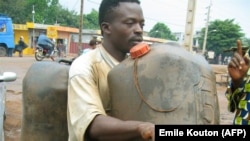Sitting on top of a yellow jerry can of fuel, Jeannine, a 48-year-old widow with five children, waits for customers on a sidewalk in Benin's economic capital Cotonou, but business is slow.
The motorbikes and cars she normally supplies are no longer stopping to stock up on her cheap gasoline, which is smuggled in from neighboring Nigeria.
"Since this morning, barely five people have stopped," said Jeanine. "Everyone prefers to go to the petrol station now."
"You know, this fuel helps feed thousands of people in Benin," said Jeannine, a 48-year-old widow with five children, who says she does not have savings "to start a new business".
Two weeks ago, a liter of "Kpayo", the smuggled gasoline sold on the side of Beninese roads, doubled from 350 to 700 CFA francs (0.5 to 1 euro). That is now higher than the petrol in service stations at the market price of around 650 CFA a liter.
In Nigeria, fuel prices have also tripled since Tinubu ended the subsidies, with food, transport and power prices feeling the knock-on effect.
Ending the subsidy was the first measure taken by Tinubu, who sees the subsidies as unsustainable financial waste costing the state billions of dollars a year, and allowing massive smuggling of subsidized gasoline to neighboring countries.
"Why should we (...) feed the smugglers and be the Santa Claus of neighboring countries," Tinubu said last week, justifying the decision, which has been unpopular in Nigeria.
For decades, Nigeria's low-cost gasoline has been transported illegally by road to its neighbors, primarily Benin, where it is resold on the black market by a multitude of informal sellers.
The scale of the trafficking is such that the price of taxi fares has almost doubled in Cotonou. In Cameroon, another neighbor of Nigeria, several motorcycle taxi unions have gone on strike in protest.
Victorien Assogba Kossi, wearing a yellow shirt like all the zemidjans (motorbike taxis) of Cotonou, wonders "what is wrong with Nigeria...?"
"Is it because the border is closed?" asks the driver who has never heard of Nigerian subsidies.
"We're going to pray to God that it goes down," said the 46-year-old man, who says he was forced to cut corn rations for his children when business slowed.
A few kilometers away, Nicolas Evedjere is happy enough. The gas station manager has never sold as much as in recent days.
"We had to close this morning, because we had nothing left to sell, our clients have multiplied by ten," he said smiling while adding he is sad "to see brothers suffer".
Suppliers had not anticipated such an explosion in demand, he said.
In front of gas stations that still have fuel to sell, long queues are now visible at peak times.
This is good news for the Beninese State, which hopes to increase its tax revenue, as informal sellers do not pay tax.
"In recent years, the Beninese government has encouraged the development of service stations in the country to reduce the importance of contraband gasoline on the market," Beninese government spokesman Wilfried Houngbedji told AFP.
"If we hadn't done this, we would currently be facing serious shortages," he said.











Forum